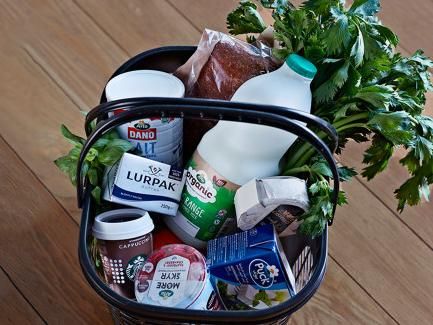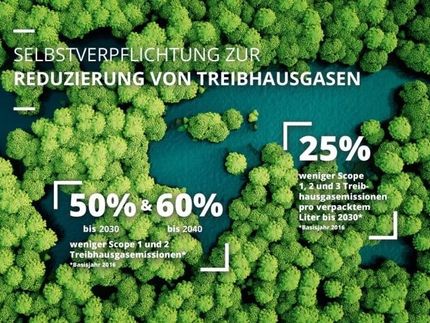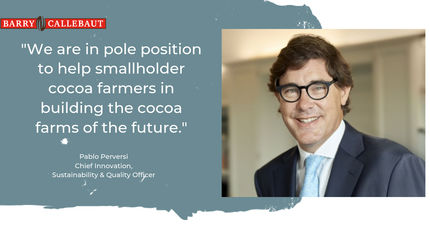Arla Foods remains on growth track despite volatile market conditions
Advertisement
European dairy cooperative Arla Foods delivered a solid performance in 2021 despite ongoing challenges from the pandemic and renewed market volatility due to high inflation. Brand growth and payments to the 9,400 cooperative farmers across Europe were at the upper end of expectations, with sales up 5.6 percent. Arla also continued to grow its brand business in the highly competitive German market in 2021, launching a campaign to strengthen its umbrella brand and implementing numerous sustainability measures in the German market.

Arla Foods
In this country, the company is among the top five in the dairy industry with its German headquarters in Düsseldorf and two large dairy plants in Rhineland-Palatinate and Mecklenburg-Western Pomerania, and is represented by brands such as Arla Buko, Arla Skyr and Kærgården, as well as private labels in the retail sector. Around 1,500 German cooperative members supply their milk to Arla.
Arla Group's total sales increased by 5.6 percent to €11.2 billion in 2021, compared to €10.6 billion in 2020, mainly due to higher sales prices and volume-based sales growth in branded products of 4.5 percent. In 2021, retail sales were also at the upper end of Arla's expectations. In this regard, Arla continued to meet high consumer demand for dairy products for consumption at home. The Arla, Castello and Starbucks (licensed brand; chilled, ready-to-drink coffee blends) brands continued their unprecedented 2020 brand growth. In addition, the Lurpak butter brand gained market share in Denmark and the UK.
Arla's increased investment in its e-commerce business supported 17 percent growth in online sales channels.
"Our strategically important brands performed exceptionally well in 2021. This can be attributed to continued strong consumer demand for high-quality, natural and nutritious dairy products. Month after month, we consistently managed our sales and operations in line with the conditions. Then, as the lockdown measures were eased and more people returned to work, we ensured product availability for consumption at home, in restaurants and on the go as demand fluctuated," says Peder Tuborgh, CEO of Arla Foods.
For Arla's farmers, who own the cooperative, 2021 was again challenging due to rising costs as well as additional demands on their operations. Arla continued to pay a competitive milk price, which increased by 23 percent during the year. In Germany, the Arla price for conventional milk averaged 36.31 euro cents in 2021 (vs. 33.72 euro cents in 2020), excluding the planned annual supplementary payment (1.5 euro cents/kg of milk) and the annual capital contribution.
To support the investments required by both the company and the farmers to implement the new five-year FUTURE26 strategy, the cooperative's elected representative assembly approved a new consolidation policy in the fall of 2021. This had been proposed by the Supervisory Board. Under the new consolidation policy, the annual additional payment to farmers will rise from 1.0 to 1.5 euro cents per kilogram of milk delivered. The prerequisite is that the company must achieve an annual surplus of at least 2.8 percent of sales. The cooperative's target range for net profit is basically 2.8 to 3.2 percent of sales.
"2021 was a tough year for farms, as both our cooperative members and our company were impacted by the ongoing effects of the pandemic and the tremendous increase in production costs. Therefore, I am pleased that our cooperative was able to achieve a competitive milk price even in the face of these challenges and that, as part of the new consolidation policy, we were able to increase the scheduled annual supplementary payment by 50 percent. Thanks to the focused efforts of our farmers, employees and management, Arla has mastered the difficult environment in 2021 and achieved high added value for our milk," says Manfred Graff, Vice Chairman of the Supervisory Board of Arla and a German farmer from the Eifel region.
Business areas growing
Arla divides its business into four business areas. Arla's Europe business area reported an increase in sales to €6.62 billion in 2021, compared to €6.41 billion in 2020. The company also gained market share in a majority of European markets with its strong brand portfolio. Compared to the previous year, market share gains of 0.3 percent were recorded across all categories - despite less eating at home again after the lockdown measures were largely lifted. Overall, Arla's European branded business achieved volume-based sales growth of 2.3 percent; following the already exceptional growth of 5.9 percent in the previous year. Both the Arla and Castello brands and Starbucks (licensed brand) were the main drivers in the branded business. As foodservice reopened in many countries in 2021, Arla's European foodservice business seized opportunities as they arose. As a result, Arla achieved volume-based sales growth of 7.8 percent in its European foodservice brand business, thanks to strong delivery capabilities, good key account management and high flexibility.
German business: growth in brands and focus on sustainability
In the highly competitive German market, as part of its European business, Arla Foods was also able to expand its branded business again last year, with volume-based sales growth of 1.7 percent for branded products. Among the already established brands, the Starbucks brand (Linzen brand) grew the most, followed by Arla Bio and Arla Buko. The company also launched a product innovation with Arla Kærgården Bio (blended spread), made from organic pasture milk butter and organic rapeseed oil. With the product launch, Arla has once again taken a pioneering role and is the only supplier of a blended spread in organic quality on the German market.
"In this country, the end of the hard lockdown measures in 2021 has also led to a slight decline in consumption of dairy products in private households compared to the strong year of 2020. Despite this, we have managed to further expand our branded business. In addition, we successfully launched a product innovation, Arla Kærgården Bio, and started our Arla umbrella brand campaign to further increase our brand awareness and gain market share. Our sustainability initiatives play a central role in this, from our farmers' farms to the packaging in the chiller cabinet," says Arla Germany boss Patrik Hansson, who took over as head of the Germany business in June 2021.
Sustainability initiatives driven forward in Germany
On the agricultural side, important sustainability initiatives were also implemented in Germany last year. For example, the second round of the Arla Climate Check program was successfully carried out on farms. The checks enable farmers to see where they stand with their CO2e footprint and their measures and to take targeted action for improvement. By participating in the program, farmers are making a significant contribution to achieving Arla Foods' ambitious climate targets. In addition, a multi-year pilot program on the use of regenerative agriculture practices has been launched, in which German farmers are also participating. And for Arla Organic farmers, the new organic standard was introduced at the end of the year. It goes beyond the EU organic standard and includes eleven new criteria in the areas of climate, biodiversity, soil health and animal welfare. In product packaging, Arla Foods is pursuing as a key goal that all packaging be 100 percent recyclable by 2025. Here, Arla was able to implement an important project in Germany: For example, the popular blended spread Arla Kærgården received new, more sustainable packaging (all 200 & 250 gram cups), which is easier to recycle compared to the previous packaging thanks to separable elements, is lighter and has a better carbon footprint - a big step with around 70 million Arla Kærgården packs (200 & 250 grams) sold annually. In addition, several packaging changes took place at Arla's Castello cheese brand, including a switch to recycled plastic (rPET material) and more paper.
Looking ahead to the current year, Patrik Hansson notes, "The persistently high inflation is also an enormous challenge for our German farmers and for our business here. This must be reflected in the deals we make with retailers. This is the only way we can ensure the future of sustainable agriculture with excellent standards." On the product side, Arla is placing a special marketing focus on Arla Organic as well as lactose-free dairy products in the coming months. "The area of lactose-free products offers enormous growth potential in Germany; we want to exploit this. Under the Arla LaktoseFREI brand, we offer a drinking milk with a unique taste and a modern, young brand that we intend to expand with further product innovations in the coming months," says Patrik Hansson.
The Arla Group's international business achieved volume-based brand sales growth of 9.1 percent, up from 11.6 percent in 2020, with total international sales increasing to €2.10 billion in 2021 compared to €1.97 billion in 2020. In addition to better pricing, the international business also gained market share in key positions, such as the Puck brand, which became the number one spreadable cheese brand in the Middle East and North Africa (MENA), and Arla Dano in Bangladesh, which was named the best dairy brand for the seventh consecutive year. To support Arla's plans for continued growth and expansion in the MENA region, Arla has invested in its production capacity for processed cheese, Starbucks on-the-go products and Puck brand cooking cream and sauces at its sites in Bahrain and Saudi Arabia.
Arla Foods Ingredients (AFI) , a wholly owned subsidiary of Arla, achieved 14.5 percent growth in its value-added ingredients business. AFI's total sales in 2021 were €794 million, compared to €716 million in the previous year. Significant increases in raw material and energy prices weighed on margins.
Global Industrial Sales , business-to-business raw material sales, increased its sales to €1.69 billion in 2021, compared to €1.54 billion in 2020.
This was due to strong global demand and price increases, especially in the second half of 2021. The increase was achieved despite a lower milk share available, as Arla was able to increase its sales through retail channels.
"The year 2021 was again marked by the Corona pandemic. And even though the global economy has recovered much faster than initially expected, the fluctuations in the dairy market and high inflation have put pressure on us and our farmers. With strong operational execution, we have successfully addressed the global challenges, strengthened our financial position and expanded our brands. At the same time, we have achieved savings throughout our supply chain," explains Torben Dahl Nyholm, Chief Financial Officer of Arla Foods.
Arla's four-year Calcium transformation and efficiency program ended in 2021 and delivered sustainable operational efficiency gains across the organization, for example in the form of supply chain optimizations and the insourcing of marketing activities. Excluding inflation, the program generated savings over its entire duration of
euros. However, due to huge inflation, the net savings came under pressure in 2021, bringing the total net savings of the Calcium program to 287 million euros after four years.
Sustainability measures throughout the value chain - new ambitious target.
In 2021, Arla continued on its ambitious path toward greater sustainability. In this context, the international, independent Science Based Targets initiative (SBTi for short) confirmed that Arla's new target - to reduce Scope 1 and Scope 2 CO2e emissions (production sites, own vehicle fleet and energy use) by 63 percent by 2030 - represent appropriate reductions to limit global warming to 1.5 degrees. The existing 30 percent reduction target for Scope 3 CO2e emissions (including farmers' delivered raw milk and packaging) continues to meet SBTi's criteria for ambitious value chain targets and is consistent with current best practices.
From a 2015 baseline, Arla has reduced its scope 1 and 2 CO2e emissions by 25 percent as of the end of 2021. The reduction in Scope 3 CO2e emissions per kilogram of milk and whey (vs. 2015 baseline) remains at -7 percent. Arla's farmers are among the most climate-efficient producers.
Outlook 2022 Arla expects inflation and volatility to impact its own business and other sectors well into 2022. Says Peder Tuborgh: "The impact of continued market volatility and high inflation on consumer behavior will be varied and difficult to predict. It is likely that we will see a slowdown in our brand growth as the market settles back to new levels. Our cooperative is built on a strong foundation. And as we did in 2020 and 2021, we will continue our strong operational performance across our supply chain to meet any new demands in this uncertain environment."
Arla plans to invest a total of €600 million in 2022; mainly in structural investments such as the expansion of Starbucks production capacity at the Esbjerg dairy in Denmark, the completion of the milk powder production facility in Pronsfeld in Germany, the expansion of mozzarella production capacity at the Branderup dairy in Denmark, and production expansions at Arla Foods Ingredients sites. In addition, investments will also be made in further digital solutions in the supply chain.
The revenue forecast for 2022 is between €11.8 billion and €12.4 billion.
Profit as a percentage of sales will be in the range of 2.8 to 3.2 percent and leverage[1] is expected to be in the range of 2.5 to 2.9.
Key figures of the Arla Group's 2021 annual results at a glance: Arla Group sales: 11.2 billion euros (2020: 10.6 billion euros) Profit share of sales: 3.0 percent (2020: 3.2 percent) Volume-based sales growth strategic brands: 4.5 percent (2020: 7.7 percent) Calcium transformation and efficiency program savings: 155 million euros excluding inflation (2020: 143 million euros) Leverage ratio: 2.6 (2020: 2.7) Milk volume: 13.6 billion kg (2020: 13.7 billion kg) Milk performance price: 39.7 eurocents/kg milk (2020: 36.5 eurocents/kg milk) (The milk performance price for Arla Foods is defined as the prepaid milk price plus the net profit divided by the total milk supply of the cooperative members. It measures the value added per kilogram of milk supplied by the cooperative members, including the annual additional payment and retained earnings in the form of individual and collective capital contribution, and is an important financial indicator for the dairy cooperative).
Note: This article has been translated using a computer system without human intervention. LUMITOS offers these automatic translations to present a wider range of current news. Since this article has been translated with automatic translation, it is possible that it contains errors in vocabulary, syntax or grammar. The original article in German can be found here.






























































